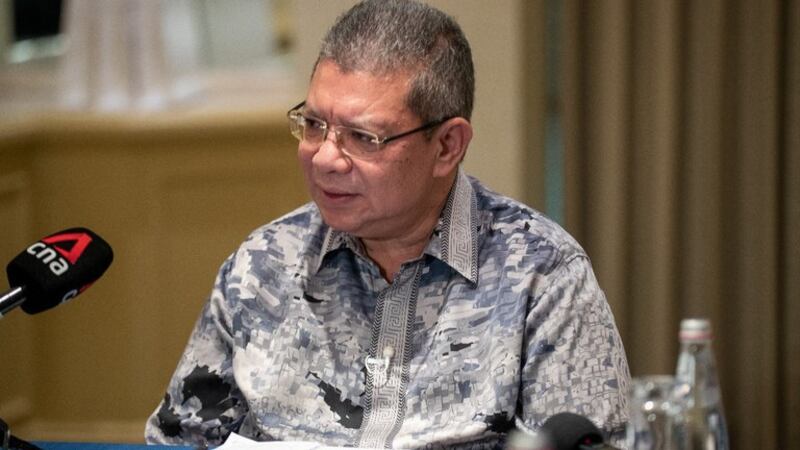Malaysia on Friday raised the prospect of junking ASEAN’s five-point consensus to resolve Myanmar’s post-coup crisis, after the Burmese junta “made a mockery” of it by executing four political prisoners.
Malaysian Foreign Minister Saifuddin Abdullah, who has been the most vocal Southeast Asian government official to date to demand that Naypyidaw’s military regime follow through on the consensus, said the 10-member regional bloc had a “big decision” to make about the pact at its summit in November.
“Until today, there has been no real progress on the 5PC. The violence continues, and in fact [has] gotten worse. … It shows the junta is making a mockery of the 5PC [five-point consensus],” Saifuddin wrote on Facebook.
“The ASEAN Summit this November will need to make a big decision. Will the 5PC be continued? Can it be improved? Or to create something new?"
To worldwide shock and condemnation, the generals who rule Myanmar put to death veteran democracy activist Ko Jimmy (whose real name is Kyaw Min Yu), former National League for Democracy lawmaker Phyo Zeya Thaw, and activists Hla Myo Aung and Aung Thura Zaw, likely on July 23.
A military court had convicted them for “terrorist” acts and they lost appeals against their death sentences. The junta had also rejected the possibility of a pardon for the condemned men.
The regime executed the four in defiance of an appeal made directly to Senior Gen. Min Aung Hlaing, the junta chief, by Hun Sen, the prime minister of Cambodia – this year’s holder of the ASEAN chair – that the military government reconsider their deaths sentences.
On Tuesday, the Association of Southeast Asian Nations harshly criticized the executions, calling them “highly reprehensible.”
The next day, the United Nations Security Council voted unanimously to condemn the executions carried out by Myanmar. The vote was unusual because China, which is friendly with the Burmese military, had often used its veto power on the council to block international efforts to sanction the junta over post-coup violence and mass killings.
The executions of the four dissidents marked a setback, Cambodia said as ASEAN chair, “in expediting progress on the implementation of the Five-Point Consensus (5PC), namely in building trust and confidence to engender a dialogue among all parties concerned, in order to end violence and alleviate the suffering of the innocent people.”
The junta has reneged on the five-point plan that it agreed to with ASEAN in April 2021 to put the country back on a democratic path.
The consensus called for an end to violence; constructive dialogue among all parties; the mediation of such talks by a special ASEAN envoy; the provision of ASEAN-coordinated humanitarian assistance and a visit to Myanmar by an ASEAN delegation to meet with all parties.

‘ASEAN members may face difficulties’
Saifuddin, Malaysia's foreign minister, believes it cannot be business as usual at ASEAN.
Through his diplomacy, Malaysia became the first member-state of the regional bloc to officially contact Myanmar’s shadow, civilian National Unity Government (NUG).
More than ever, in the wake of the executions, ASEAN needs to meet that government’s representatives as soon as possible, Saifuddin said.
“Now is the time for this meeting to be hastened and [for] its progress [to be] made public,” Foreign Minister Saifuddin wrote.
“I am of the opinion that ASEAN needs to have a framework that has an end game and lay out the matters/processes required to achieve that end game. … In this context, ASEAN needs to have accurate and up-to-date information about what is actually happening by obtaining it directly from the involved parties.”
The end-game, he said, is a “democratic, inclusive and just, peaceful and harmonious, prosperous Myanmar whose civil and political rights are guaranteed by the constitution.
Saifuddin reiterated that Myanmar military regime representatives should “not be allowed” at any meeting of the Association of Southeast Asian Nations, including the next ASEAN foreign ministers’ gathering, scheduled for Aug. 3 in Phnom Penh.
Mahbubul Haque, a scholar who is an expert on Myanmar, said he never had much hope for the five-point consensus on Myanmar – nor was he very optimistic about a potential new plan either.
“To make a consensus among the member-states will be difficult. Myanmar did not respect the international community’s decision,” the senior lecturer in international relations at the Universiti Sultan Zainal Abidin in Malaysia told BenarNews.
“It will be highly appreciated if Malaysia can take a consistently strong political stand to restore democracy in Myanmar,” he added.
Nisha David in Kuala Lumpur contributed to this report.
BenarNews is an RFA-affiliated news service.

